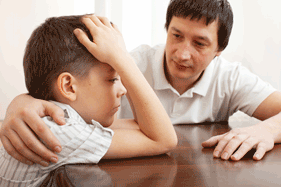Helping Children Cope with Disasters
Children are not exempt from psychological impacts caused by man-made or natural disasters. Understandably, many young children may feel frightened and confused. Fortunately, most children, even those exposed to trauma, are quite resilient.
 By creating an open environment where they feel free to ask questions, we can help them cope with stressful events and experiences and reduce the risk of lasting emotional difficulties. Although these may be difficult conversations, they are important. By creating an open environment where they feel free to ask questions, we can help them cope with stressful events and experiences and reduce the risk of lasting emotional difficulties. Although these may be difficult conversations, they are important.
- Create an open and supportive environment where children know they can ask questions. However, it's best not to force children to talk about things unless and until they're ready.
- Give children honest answers and information. Children will usually know, or eventually find out, if you're "making things up." It may affect their ability to trust you or your reassurances in the future.
- Use words and concepts children can understand. Gear your explanations to the child's age, language, and developmental level.
- Be prepared to repeat information and explanations several times. Some information may be hard to accept or understand. Asking the same question over and over may also be a way for a child to ask for reassurance.
- Acknowledge and validate the child's thoughts, feelings, and reactions. Let them know that you think their questions and concerns are important and appropriate.
- Remember that children tend to personalize situations. For example, they may worry about their own safety and the safety of immediate family members, friends, and neighbors.
- Be reassuring, but don't make unrealistic promises.
- Help children find ways to express themselves. Some children may not want to talk about their thoughts, feelings, or fears. They may be more comfortable drawing pictures, playing with toys, or writing stories or poems.
- It's a good opportunity to show children that when something scary happens, there are people to help.
- Children learn from watching their parents and teachers. They will be very interested in how you respond to events. They also learn from listening to your conversations with other adults.
- Don't let children watch too much television with frightening images. The repetition of such scenes can be disturbing and confusing. Although parents and teachers may follow the news and the daily events with close scrutiny, many children just want to be children.
- Monitor for physical symptoms, including headaches and stomachaches. Many children express anxiety through physical aches and pains. An increase in such symptoms without apparent medical cause may be a sign that a child is feeling anxious or overwhelmed.
Consider seeking help from a mental health professional if a child:
- is preoccupied with questions or concerns about fires or other natural disasters
- has ongoing sleep disturbances
- has intrusive thoughts or worries
- has recurring fears about death, leaving parents, or going to school
Resources
|

 By creating an open environment where they feel free to ask questions, we can help them cope with stressful events and experiences and reduce the risk of lasting emotional difficulties. Although these may be difficult conversations, they are important.
By creating an open environment where they feel free to ask questions, we can help them cope with stressful events and experiences and reduce the risk of lasting emotional difficulties. Although these may be difficult conversations, they are important.